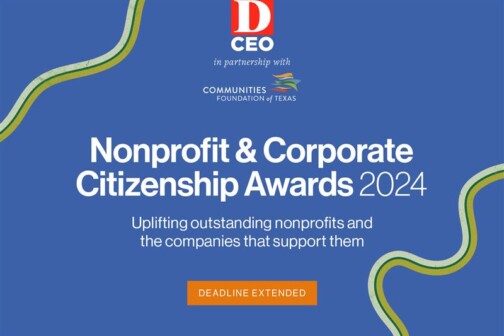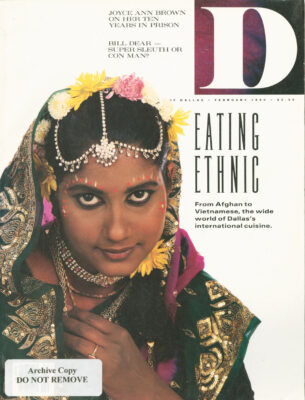CITY HALL TYPES WERE BRISTLING
about this time last year at a report that was making the rounds. Seems that at least one rival city was using a video of a shouting match involving City Councilwoman Diane Ragsdale in an economic development presentation. Evidently the tape was being used to play up our supposedly fractious city politics and make other cities-Atlanta, for instance-shine all the brighter.
But if the use of that embarrassing incident by a competitor raised hackles, it hardly outstripped the dismay felt by some of those same insiders over how we’re bungling things right here at home. When it comes to economic development, recent efforts have been marred by seemingly endless hurdles, internecine turf battles, and personality clashes. Dallas often comes off like a sort of Rodney Dangerfield of the Metroplex. A litany of examples:
● Last spring, Dallas was said to be under consideration by Sears Roebuck & Co. as a relocation site for its merchandise group. Scott Eubanks, then chief operating officer of the Dallas Partnership, the economic development arm of the Greater Dallas Chamber, was quoted in the media as saying there were no suitable sites for Sears within the city of Dallas. Although Eubanks insists his remarks were taken out of context, they so enraged Dallas’s powers-that-be that City Manager Richard Knight wrote a letter of protest to Chamber President Richard D. Upton. Eubanks and Upton promptly apologized to Knight. (Sears subsequently decided to move to a Chicago suburb.)
● A few weeks later, Michael L.Norwood, director of the city’s Office of Economic Development, asked Eubanks if the partnership would consider contributing $50,000 to the “Southward!” program to promote business development in southern Dallas. Eubanks turned him down cold. This so infuriated Norwood that he now complains about the partnership’s “flat refusal to commit to represent the city of Dallas.” Grouses Norwood, “After this and the Sears episodes, the Dallas Partnership really ripped the blanket with City Hall.” Eubanks maintains that the partnership’s mandate to represent “Greater Dallas” prevents it from showing favoritism toward any one city.
‧ In September, Eubanks resigned his $175,000-a-year post to accept the presidency of the newly formed Arizona Economic Council in Phoenix. Although both parties claim the parting was amicable, Eubanks reportedly chafed at Upton’s autocratic management style. Moreover, when Eubanks originally was hired to build what he called a “strictly businesslike, bottom-line-oriented organization of economic development professionals,” he’d exacted an agreement that allowed him to run his own show independent of the chamber. All that changed when Upton, who was hired away from Minneapolis in June of 1988, came in with a new authority to run everything.
●Then there’s the tale of civic leader and ex-EDS chief executive Mort Meyerson’s unfortunate encounter with American Airlines’ CEO Robert L. Crandall. A little more than two years ago, Meyerson was exploring possible ways to restructure the manner in which the Dallas/Fort Worth Metroplex markets itself internationally. Presenting a single, unified face for the entire region, he reasoned, would be vastly preferable to the multiplicity of suburban constituencies all vying for their piece of the international trade and investment pie. In the course of his research, Meyerson called on Crandall and proposed that a source of funding for such a marketing effort might be-ready for this?-a tax on jet fuel. After all, a levy of four cents a gallon was being used successfully in Boston for this purpose. Meyerson now concedes that Crandall wasn’t exactly bowled over by his proposal. Needless to say, the preposterous (to Crandall) idea never saw the light of day.
‧ A few months later, the local press reported that a preliminary draft of a Dallas Citizens Council report contained a recommendation that the North Texas Commission become, in effect, an arm of the Dallas Partnership. This reflected the thinking of some business people that the two duplicated one another, and that certain executives were getting increasingly resentful over having to contribute between $1,000 and $50,000 a year to each organization. The idea created a minor furor, mostly in the suburbs, and was quickly dropped. Why should the NTC, its supporters asked, subordinate itself to an organization perceived as primarily promoting Dallas?
Meanwhile, against this backdrop of sub rosa power struggles and a crazy quilt of redundant, sometimes conflicting interests, Dallas is becoming a near-vacuum surrounded by an embarrassment of relocation riches. In the last decade, the city has watched its suburbs reap virtually all the big corporate relocation harvests: most recently JCPenney (headed to Piano), GTE Corp. (Irving’s Las Colinas), Fujitsu America (going to Richardson), and Exxon Corp., which also is moving to Las Colinas this summer. To some degree, the city is sharing the fate of the New Yorks and Cbicagos of the world: serious erosion of its tax base caused by migration from the costly confines of the central city to the suburbs.
The trend away from downtown high-rises and toward spacious “campus” complexes accelerated in the Eighties when Ross Perot assembled the acreage for his Legacy project in Piano. Companies like Southland Life Insurance, Frito-Lay, and EDS already have moved out there from downtown or elsewhere in the city. Former NTC president Harden Wiedemann, now president of an international merchant bank, believes that those defections are just the tip of the iceberg. He calls promotion of the CBD to major corporations “dinosaur thinking.”
Not everyone agrees that we should stop pitching downtown Dallas. But in view of seemingly inevitable suburban migration, how can the Metroplex’s regional marketing effort be reconciled with the needs of Dallas and Fort Worth to be competitive? To the city of Dallas’s Mike Norwood, the answer is simple: “Dallas has to compete for business with the Carrolltons and Irvings as well as the Denvers. We want to be assured of having access to every prospect.”
Then there are those who believe that what’s good for Irving is good for Dallas. They point to the way Houston reorganized its economic development function last year as a model of regional coordination. Its chamber, the Houston Economic Development Council, World Trade Association, and what’s called shared services were all placed under the new umbrella of the Greater Houston Partnership.
Houston, however, doesn’t have to cope with the mélange of suburbs that Dallas does. As a result of an aggressive annexation policy, more than half of metropolitan Houston’s populace lives inside the city. In contrast, less than one-fourth of the Metro-plex population resides in the city of Dallas. Ex-Dallas Partnership chief Scott Eubanks says wryly from his new Phoenix digs, “Houston doesn’t have a Fort Worth sitting over there.”
So Dallas boosters are stuck between a rock and a hard place-the need to appear to be a team player with the rest of the region while coping with (and combating) the frustration of losing deal after deal.
Publicly at least, the city can point to a two-pronged approach in the future. Vehemently disputing that the city is another hemmed-in Manhattan, city of Dallas executives point to the city’s next potentially fertile development frontier-southern Dallas. And despite their misgivings, local economic development types apparently are making a healthy stab at regional unity. According to Eubanks, the Dallas Partnership already has participated in some cooperative projects, such as trade fairs and a jointly funded video.
The Greater Dallas Chamber’s Upton says such efforts have been intensified through the recent formation of the Dallas/Fort Worth Regional Marketing Group to coordinate marketing for the entire region. The alliance is composed of representatives of the Dallas and Fort Worth chambers, NTC, and D/FW. The group is hiring an administrator to coordinate its activities.
As far as initiatives in developing southern Dallas, Upton is optimistic there too. “We intend to actively support southern Dallas. We may even become an investor.” Upton is bullish on pulling together the fractious entities involved in economic development. “We’re emphasizing the team approach,” he says. “I detect a real sense of enthusiasm among all involved.”
Not everyone shares his optimism. While some attack Upton’s group for being too parochial, others just as vehemently believe that the Dallas chamber needs to do a better job of looking out for Number One. Skeptics fear that the effort will keep muddling along until some statesmanlike leader-an Erik Jonsson-rises up to shame the turf protectors and force cohesion onto the process. In the meantime, complacency can be dangerous. After October’s Fortune cover story cast the spotlight on Dallas as the nation’s best city for business, it’s easy to feel we’re on a roll. Observes NTC President Rick Douglas, “It’s important that we not lose the opportunity to capitalize to the utmost on the preeminent position we’ve gained in the national and world economies. I think we have the leadership to do it.”
But what about dear ol’ Big D? Says City Council member Max Wells, “If the city, the chambers, and everybody else can’t find a way to work in harmony, we oughta be horsewhipped.” Yeah, Max, but who’s gonna whip whom?
Related Articles

D CEO Award Programs
Deadline Extended: D CEO’s Nonprofit and Corporate Citizenship Awards 2024
Categories include Outstanding Innovation, Social Enterprise, Volunteer of the Year, Nonprofit Team of the Year, Corporate Leadership Excellence, and more. Get your nominations in by April 19.
By D CEO Staff

Local News
Texas Lawmakers Look to Take Zoning Changes Out of Dallas’ Hands
Dallas is taking resident input on its ForwardDallas land use plan, and a vocal group is leading the opposition. But new talk among conservative Texas policy makers indicates the decision might not be in the city's hands for long.

Healthcare
Convicted Dallas Anesthesiologist Could Face 190 Years for “Toxic Cocktails” in IV Bags
Dr. Raynaldo Ortiz worked at the Baylor Scott & White Health facility after spending time in jail for shooting a dog and while having a suspended medical license.
By Will Maddox


